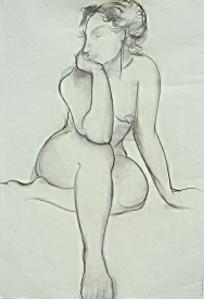| VERONICA BUSTAMANTE´S LINEAR
FREEDOM
2
0 0 7
|
Versión
Española
|
|
| |
| Enrique
Castaños Alés |
|
The artist shows her
recent work in the first solo exhibition in Malaga, Spain.
|
|
|
|
Trained between 1977 and
1987 in the Centro de Estudios de Restauración de Obras de Arte (Center of
Studies on Restoration of Works of Art ),
the Arjona studio in Madrid as well as with renowned painter Knox Martin in New
York 1992 , Veronica Bustamante Loring (Madrid 1960), presents a complete selection of her recent
drawings in her solo exhibition in the
Henarte Gallery Malaga, where her family roots lay. These drawings, are mainly
made with ink, charcoal and pastel pencil on paper. It’s been a coincidence,
but the subject matter of the madrilenian painter is the same as the Picasso
exhibition commented above on this page: feminine nude. But something that’s
not a coincidence is the extraordinary importance of drawing within the whole
of Verónica Bustamante’s work. She knows- and she expressed it with the
conviction of an “initiate”- that drawing is the main discipline for an artist;
it is it’s vehicle to communicate with the world of objects and things.
|
|
|
|
Verónica Bustamante’s drawn forms, well rounded, generous, opulent and
ample, have varied influences; from classical sculpture to Baroque art and modern and contemporary artists, specially
Picasso and Matisse. In one of her better achieved drawings, a charcoal drawing
where a young girl in the nude is sitting on a bed, her elbow resting on her
knee; one hand lies on her cheek while the other arm lies extended firmly on
the bed, one can clearly see that it has been made “live”; that is, in front of
a live model. Otherwise one cannot explain the body’s configuration; the volumetric
accuracy of the limbs, with gentle charcoal shades,to make the modelling effect more natural.
|
 V V
|
| |
|
Spontaneity and Freshness.
|
|
In other works in the exhibition, one sees figures lost in their
thoughts, looking from a profile to an indefinite point. Very few works have a
sparkle of colour; those made with pastel I found more elaborate. On the other
hand, drawings made with sanguine or ink, stand out for their freshness and
spontaneity; for their freedom of forms, variety of postures and for the
achievement of a remarkable expressive synthesis.
|
|
|
|
|